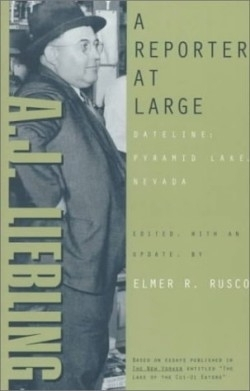Reporter at Large
Dateline: Pyramid Lake, Nevada
Watching the local Indians dressed in J.C. Penney cowboy clothes as they comfortably sat alongside the white ranchers at saloons and craps tables, Liebling didn’t expect to find controversy brewing on the shores of Pyramid Lake just outside Reno in the 1950s.
He arrived in Reno as just another soon-to-be-unwed man taking advantage of Nevada’s more lenient divorce laws, which required a six-week residency. He got his divorce and eventually an understanding of the combative undercurrents of the two populations there. “Without further inquiry, I became convinced that the Indians were being cheated, because all the Indians I had ever heard of had been,” he wrote.
In this reprint of Liebling’s articles on Pyramid Lake, which were originally published in The New Yorker in 1955, readers get a history lesson told with a folksy twist of personal insight. “Since to read Liebling is to laugh and enjoy while learning, this book will surely increase the already large number of his admirers,” editor Elmer Rusco states in his introduction to the collection.
The main dispute at Pyramid Lake surrounded acres of land the settlers and Indians claimed as their homeland. Most importantly, these lands were irrigated—as necessary to grow feed for the cattle. Courts gave the land to the Indians, so the white ranchers cut off the irrigation supply and made the acres useless. Eight times Nevada Senator Harry McCarran introduced bills to give the land to the white ranchers. Each failed. The dispute continued for decades and still was not over when Liebling’s writings were published. Both sides felt wronged. As one of the last white ranchers on Pyramid Lake said, “Why, it’s the unjustest thing I ever heard of.”
Liebling shows obvious affection for the Paiutes, who historically were fishermen but became rangers after settlers destroyed the population of the once-prevalent cui-ui fish by diverting water from the river and lake where they spawned. He calls the Indians “as indigenous as jackrabbits” and describes the settlers’ claims of ownership as the “preeminent right of the first trespasser” theory.
The true power of Liebling’s writing is to capture the nuances of individual characters and situations. He describes an Indian commandment as “Thou shall not work, except for a little fishing.” He also comments that, “Nothing amuses a Paiute more than the sight of another Paiute dressed as an Indian.”
Combined with historical maps and photographs, this reprinted collection gives readers a delightfully holistic insight into the complex conflict and people of Pyramid Lake.
Reviewed by
Marjory Raymer
Disclosure: This article is not an endorsement, but a review. The publisher of this book provided free copies of the book to have their book reviewed by a professional reviewer. No fee was paid by the publisher for this review. Foreword Reviews only recommends books that we love. Foreword Magazine, Inc. is disclosing this in accordance with the Federal Trade Commission’s 16 CFR, Part 255.

